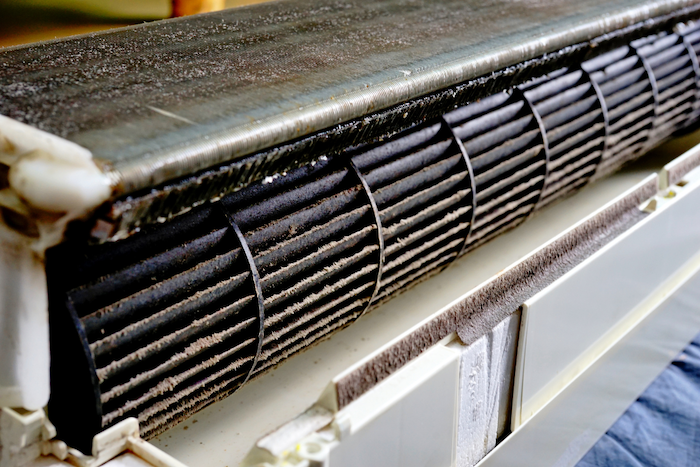 How many times have you turned on the air conditioning in the summer and ended up with a cough? It’s not just a coincidence- your air conditioning unit could actually be giving you a cough.
How many times have you turned on the air conditioning in the summer and ended up with a cough? It’s not just a coincidence- your air conditioning unit could actually be giving you a cough.
In this blog post, we will discuss how and why air conditioning can give you a cough, as well as how to mitigate it. Keep reading to learn more!
Do you have “air conditioner lung”?
If you live in or frequent a place with the air conditioner on, we don’t blame you – especially this time of the year!
But could it be harming you?
Like any other appliance, air conditioners need maintenance. Thorough cleanings and filter changings are a must. If not, mold could build up. And even if you don’t see any mold, it can still travel via microscopic spores you can’t see.
But just because you can’t see them, doesn’t mean they’re not irritating your throat and lungs.
Symptoms of “air conditioner lung”
Air conditioner lung symptoms may vary, but they generally include:
- A dry cough or wheeze
- The inability to catch your breath
- A feeling of tightness in the chest
- Fever
- Chills
- Fatigue
- Headache
Symptoms of air conditioner lung typically appear four to six hours after exposure to the allergen and may last anywhere from 12 hours to a few days.
Main causes of an air conditioning cough 
One reason your air conditioning could be giving you a cough is because it is drying out the air. This can cause irritation in your throat and lungs, which can lead to coughing. It can also trigger asthma attacks and exacerbate other respiratory problems. In addition, dry air can cause static electricity, which can be a shock hazard. And if that wasn’t enough, it can also lead to dehydration since your body has to work harder to produce mucus when the air is dry.
Additionally, if there is mold or mildew present in your air conditioner, this can also cause a cough. Mold and mildew release spores into the air, which can irritate your lungs and cause you to cough. If left untreated or unaddressed, this can develop into a more severe condition and may permanently cause damage to your lungs.
How to prevent “air conditioner lung”
So, what can you do to mitigate this problem?
First, make sure that your air conditioner is properly maintained. This means regularly cleaning it and changing the filter.
Maintaining your air conditioner is important for your health for a number of reasons. First, it helps to ensure that the air in your home is clean and free of allergens and other irritants. This is especially important for people with asthma or other respiratory conditions. Second, it helps to keep the temperature in your home comfortable, preventing you from becoming overheated or cooled too quickly. Finally, it helps to prolong the life of your air conditioner, saving you money in the long run.
 Additionally, you can use a humidifier in your home. There are many reasons why using a humidifier in your home is a good idea for your health.
Additionally, you can use a humidifier in your home. There are many reasons why using a humidifier in your home is a good idea for your health.
Firstly, humidifiers help prevent a cough from air conditioning. When the air is too dry, it can irritate the throat and cause coughing. By keeping the air moist, humidifiers can help soothe the throat and prevent coughing fits.
But there are more benefits than helping prevent a cough. Dry air can cause a number of problems, including nosebleeds, dry skin, and scalp itchiness. It can also worsen symptoms for people who suffer from allergies or asthma. In addition, dry air is one of the leading causes of static electricity. By adding moisture to the air, humidifiers can help to alleviate all of these problems.
As a result, using a humidifier in your home is an easy way to improve your health and well-being.
Do you have any other tips for preventing a cough from air conditioning?
Share them with us by emailing info@puralityhealth.com!
And remember, if you think your air conditioner may be making you sick, be sure to contact a professional for help. They can inspect your unit and determine if it needs to be cleaned or repaired. Taking these simple steps can help you enjoy the summer months without worry!
Another thing that can help…
Do you find that you’re overly sensitive to things like this? Do you get sneezy or wheezy a little too easily?
It could be because your body is releasing too much histamine.
 Histamine is a chemical that your immune cells release when exposed to an allergen. This causes the many symptoms of allergic reactions, such as sneezing, coughing, and swelling.
Histamine is a chemical that your immune cells release when exposed to an allergen. This causes the many symptoms of allergic reactions, such as sneezing, coughing, and swelling.
Thankfully, vitamin C helps regulate the release of histamine within the body, allowing the chemical to only be released when there’s a real threat.
If you find you’re a bit more sensitive to common allergens than you’d like to be, vitamin C may be able to help!
Purality Health’s Vitamin C comes in an easy-to-take liquid form that tastes like orange goodness!
You’ll look forward to taking it every day!
Not just because of the taste, but how it makes you feel!
